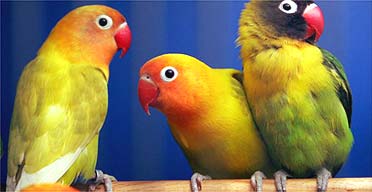
The EU is expected to announce a temporary ban on the commercial importation of millions of wild birds today after a request from the British government for tougher action against avian flu.
The decision, which is due to be endorsed by EU veterinary experts, comes as experts in the UK called for a review of quarantine procedures in the wake of Britain's first case of infection from the most virulent strain of the virus.
Yesterday it emerged that the South American parrot that died of bird flu was likely to have been quarantined at Pegasus Birds Ltd in Essex.
A spokesman for the Department for Environment, Food and Rural Affairs refused to confirm the identity of what he said was a "disease site", but veterinary and other animal welfare sources said the exotic bird importer and retailer had been responsible for housing the parrot in quarantine conditions. The bird, from Surinam, died after apparently contracting H5N1 from imported Taiwanese birds kept in the same living space in what a leading avian vet said yesterday was a "failure" of quarantine regulations.
The company is based in West Horndon, Essex, and by coincidence backs on to the Orchard Farm abattoir where foot and mouth disease was detected in 2001. It emerged yesterday that the RSPCA had previously investigated animal welfare at Pegasus Birds.
Yesterday half the aviaries at the site were empty but some chickens and parakeets were in cages waiting to be sold.
Brett Hammond, listed as the director of Pegasus Birds, refused to comment when contacted at home. His partner, Katrin Geilin, said: "We don't want to say anything about the parrot that died." Later she said: "We have been told by Defra not to say anything." Pegasus staff also refused to comment. "We cannot give out Brett Hammond's mobile, sorry. You will have to contact Defra," one said.
Alan Jones, a leading avian vet, said there should be an urgent review of the quarantine conditions in the UK. "In my experience there should never have been a situation where birds from different continents shared the same air space," he said. "In this instance the Taiwanese birds have infected the South American parrot.
"I would question the wisdom at the moment anyway of having brought in birds from south-east Asia at all."
Debby Reynolds, the government's chief veterinary officer, said yesterday that quarantine regulations would be examined urgently, adding there were "quite a number of unanswered questions." Imported birds must spend at least 30 days in quarantine.
Quarantine facilities are privately run and licensed by Defra but Duncan McNiven, an RSPB investigative officer, said the system was badly regulated. "What people often don't realise is that these birds aren't held in some state-of-the-art facility at Heathrow airport.
"They go as a job lot, often to the dealers themselves, and are quarantined in a shed in a backyard and a government vet will visit and take away dead birds to test.
"They are then sold on through pet shops and bird fairs in huge halls like the NEC with all these imported birds and lots of people crowded round."
Avian vets yesterday welcomed the EU decision expected today, to widen the ban on importing live birds to Europe. Import bans have already been imposed on live birds from areas where H5N1 has been confirmed, including Turkey, Romania and the Greek island of Chios.
According to the RSPCA up to 250,000 rare birds, some of which are under threat of extinction, are commercially imported into England and Wales each year under the convention on the international trade in endangered species, or Cites. Across Europe, between 2000 and 2003, some 2.74 million birds were imported under Cites from South America, China and Africa for sale in pet shops.
David Bowles of the RSPCA said the ban could not come too soon. "We have campaigned actively for this for the last six months because of the avian flu issue. But we also have asked for it for the last 15 years because the business is loaded with birds that have been traded almost to extinction."
Some vets, however, feared the import ban would fuel an already thriving underground trade in bird imports.
Professor Mac Johnston, the head of the Royal Veterinary College's animal and public health division, said "The question is whether it is right to stop the legal trade, knowing that at the same time you are giving the crime gangs a boost."
Exotic pets
· Up to 250,000 exotic wild birds are imported into the UK each year, according to the RSPCA
· Some species, such as the hyacinth macaw from South America, have been so heavily traded they are now listed as endangered
· The most popular species for pet owners in the UK are the grey parrot, the Senegalese parrot and macaws
· Bird enthusiasts can pay up to £1,000 in a British pet shop for a wild-caught grey parrot
· Until hyacinth macaws were listed as endangered the birds sold for £6,000 each

